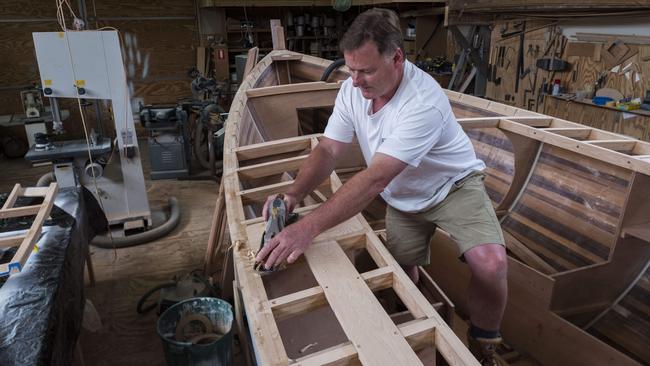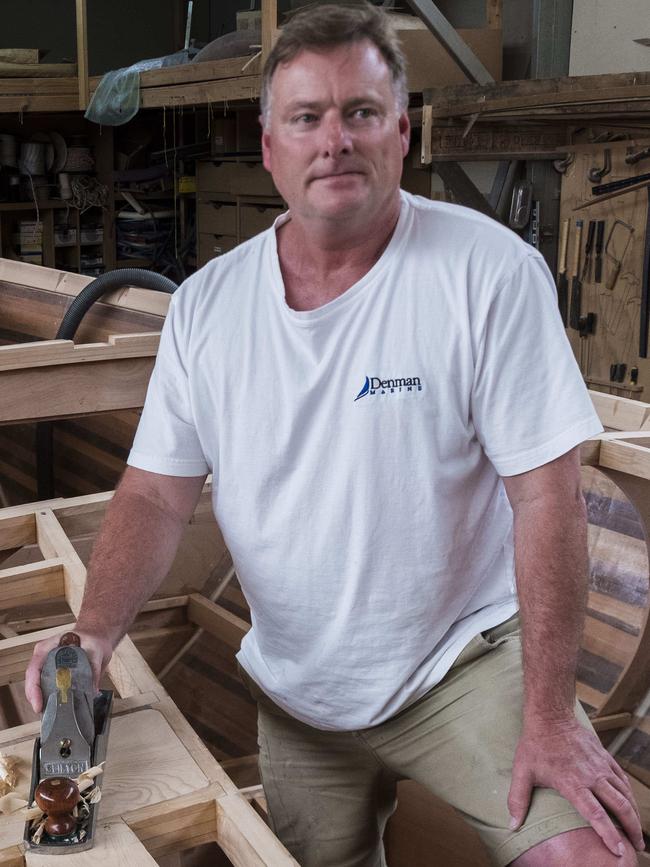Tasmanian Specialty Timbers Alliance president Andrew Denman says Sustainable Timber Tasmania ‘no longer fit’ to manage our precious resources
Over the past decade, special timber volumes have declined so dramatically that its future is under the darkest of clouds — and Sustainable Timber Tasmania needs to stop managing it, writes Andrew Denman >>

Opinion
Don't miss out on the headlines from Opinion. Followed categories will be added to My News.
Special Timbers is a term that many Tasmanians are familiar with.
It encompasses our endemic species, including blackheart sassafras, myrtle, blackwood, celery-top pine and Tasmania’s most iconic timber – Huon pine.
These highly-valued, slow-growing timbers underpin a significant part of our state’s intangible cultural heritage.
Thousands of Tasmanian craftspeople combine these timbers with passion and skill to make objects of beauty and function that enrich our society, including musical instruments, fine furniture and wooden boats.
Many such skills are passed down through generations and are inextricably linked to the species used.
But there’s a problem.
Over the past decade, special timber volumes have declined so dramatically that the ongoing viability of the sector is under the darkest of clouds.
Since 2011, millable special timber log volumes (as a proportion of overall harvested volumes) have plummeted by 89 per cent.
Volumes of celery-top pine millable logs (our most used boat-building timber) have dropped by 99 per cent.
Huon pine salvage volumes have dropped by 90 per cent, with no Huon pine salvaged for the past few years.
Quality blackheart sassafras is impossible to obtain, and smaller saw millers cannot obtain logs to mill and fulfil orders.
So how did we get to this point?

Quite simply, it is a combination of deliberate market distortion and resource mismanagement by Sustainable Timber Tasmania and failure of Government policy implementation.
STT advised in the recent GBE hearings they are aware of unmet demand in the industry; despite claiming otherwise for years.
STT also advised in the hearings that despite this unmet demand, they don’t access the tens of thousands of hectares of forests they are paid to manage for long-term special timber production that would go towards meeting this demand.
Furthermore, STT special timber harvesting schedules are not informed by industry demand, with non-blackwood special timbers only indiscriminately produced as a by-product of harvesting for eucalypt.
STT’s most recent three-year wood production plan shows that out of 45 coupes scheduled to supply special timbers, 97.8 per cent of the coupes will be harvested by methods not allowed under the Special Species Timber Management Plan, with more than 70 per cent of these coupes being clear-felled. This is completely unacceptable.
The issue around Huon pine supply could have easily been avoided.
STT (Forestry Tasmania) completely botched a 2015 resource assessment on the Huon pine salvage resource on Teepookana Plateau. Five years into a 21-year supply scenario, they claimed only one year’s worth of supply remained but did not advise the industry of this. Rather they simply stopped salvaging the resource and have not been back since.
STT’s ongoing mismanagement of the special timber resource and refusal to supply timber to the industry shows that it is no longer fit to manage special timbers in Tasmania.
The government must also shoulder some responsibility for their role in the supply crisis.
Although the government is to be commended for their support in developing the 2017 Special Species Timber Management Plan (and Labor should also be commended for supporting this), a failure to follow through with an implementation strategy, coupled with a failure to ensure that their GBE was fulfilling its special timber role has left the industry with a catastrophically broken supply chain which threatens business viability.
Additionally, the failure to adopt industry-specific recommendations from the Ministerial Advisory Council on Forestry has worsened the situation.
Despite continual lobbying of the government over many years regarding supply chain failures, the revolving door of ministers and advisers and the lack of GBE oversight have ensured the “roadblocks” identified by the government in 2017 preventing implementation of the plan remain firmly in place.
That said, the government now has an opportunity to work with the sector to salvage the situation before it is too late.
Most people in the special timbers sector and most of the public would support forests managed for long-term, sustainable selective harvesting and wise use of small volumes of special timbers.
The best way forward would be to establish a new independent authority to manage special timbers, relieving STT to concentrate on a regrowth/plantation eucalypt business model.
The new special timbers authority would perform the functions that STT has failed to do.
All special timber forests currently managed by STT should be removed from their control and placed under the new authority’s management.
Special timber forests would then be managed for the long-term, sustainable production of special timbers – not as an afterthought of industrial-scale logging.
Any such authority would be small, fit-for-purpose and self-funded through log royalties, a simple solution that would work for the sector.
The Tasmanian special timbers sector should have a bright future and be the icon of the state’s timber industry.
However, we cannot do it on our own; it will need prompt and decisive action from government, a removal of STT from the special timbers supply chain and land management arena, and support from everyday Tasmanians to take us there.
Andrew Denman is a Tasmanian wooden boat builder, former Ministerial Advisory Council on Forestry member and President of The Tasmanian Specialty Timbers Alliance.


